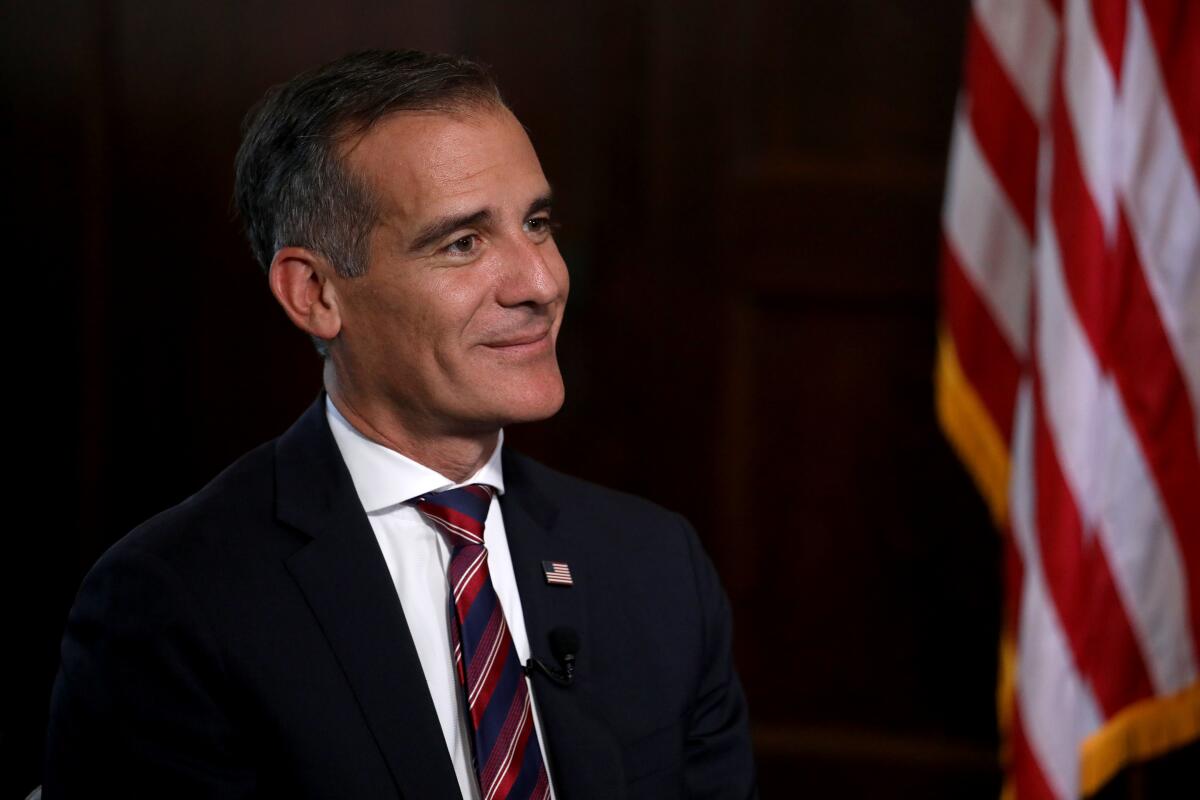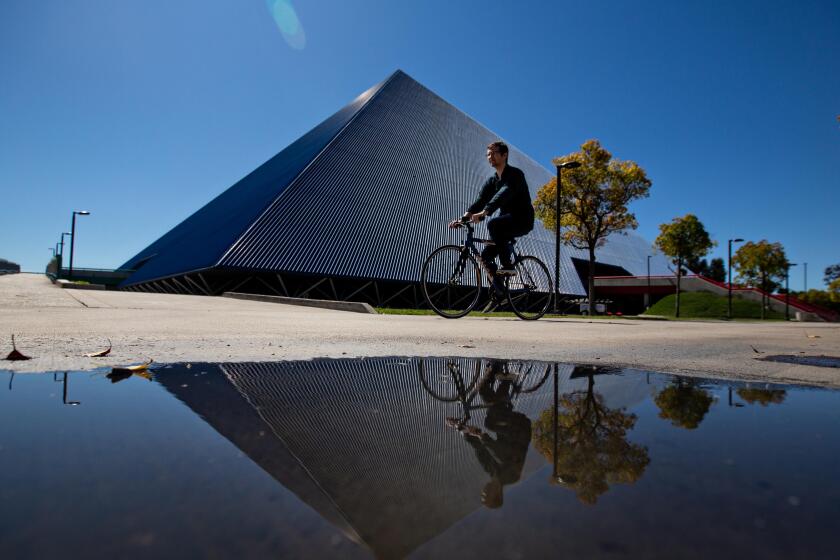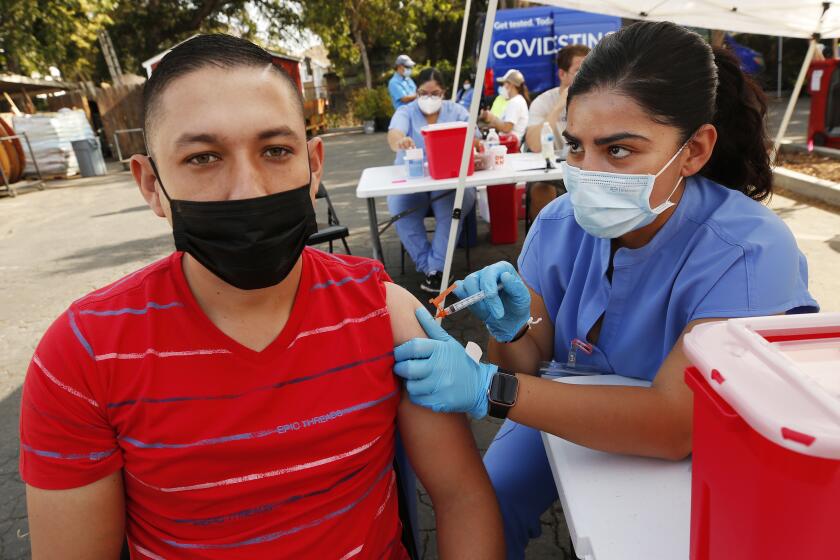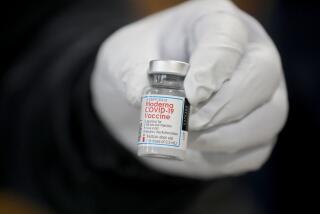L.A. will require city employees to get vaccinated or regularly tested for COVID-19

- Share via
Los Angeles will require city employees to provide proof of vaccination against COVID-19 or undergo weekly testing to show they have tested negative, Mayor Eric Garcetti and City Council President Nury Martinez announced Tuesday. Garcetti, announcing the new requirements, cited “an alarming spike in cases among our city workforce.”
The plan is expected to be rolled out through a mayoral order issued Wednesday, following a meeting of a city committee focused on employee relations that will discuss how the new requirements will be implemented.
Martinez expressed deep frustration with the rebound in infections, saying that Angelenos who had stayed inside to protect themselves and others were “getting tired of protecting people who don’t want to protect themselves.”
“We need unvaccinated Angelenos to stop dragging their feet,” Martinez said. “As the largest employer in the city of Los Angeles, this is us doing our part.”
Many details about the plan remain to be worked out, but city departments will be directed to gather and report information about whether their employees are vaccinated by Aug. 13, Garcetti spokesman Alex Comisar said.
The announcement comes one day after California officials said state and healthcare employees would soon be required to show proof they’ve been vaccinated or undergo regular testing for COVID-19. New York City declared similar plans.
San Francisco and Pasadena have also announced future vaccination requirements for their employees; both cities have hitched their requirements to the U.S. Food and Drug Administration granting formal approval to at least one of the COVID-19 vaccines now under emergency authorization.
L.A. could eventually mandate COVID-19 vaccination for city employees without offering testing as an alternative; Garcetti and the council will pursue a vaccine mandate once the FDA grants full approval, the mayor said in a statement.
As the Delta variant has swept through Los Angeles and infection numbers have resurged, a growing number of L.A. politicians have argued that it is time for the city to impose such a requirement. Lagging vaccination rates among police officers and firefighters, in particular, have spurred concern because those workers interact regularly with the public.
California State University — the nation’s largest four-year public university system — will require COVID vaccinations for students, faculty and staff.
“Plain and simple — vaccinations are the only way out of this pandemic,” Councilman Mark Ridley-Thomas said in a statement late Monday, announcing that he would soon introduce a motion to draw up a policy requiring all city employees to be fully vaccinated against COVID-19.
“If we want our economy to fully recover, if we want our children to be able to go to school without masks on, and if we want the most vulnerable members of our community to not end up in the hospital, we must all do our part and this motion is a step in the right direction,” Ridley-Thomas said. “It’s time to get it done.”
Ahead of the L.A. announcement, Long Beach announced a similar plan, with Mayor Robert Garcia saying city employees will need to be vaccinated or show a weekly negative COVID-19 test.
Over the past week, Los Angeles County has reported an average of nearly 2,300 new cases per day, nine times the level seen a month ago, according to data compiled by The Times.
On Monday, 891 coronavirus-positive patients were hospitalized countywide, with 195 in intensive care. Both figures have doubled in just the past two weeks. During the height of the last surge, an average of roughly 15,000 new cases were reported every day, and more than 8,000 COVID-19 patients were hospitalized.
LAPD Chief Michel Moore on Tuesday told the civilian Police Commission that the department had 33 personnel test positive for the coronavirus in the last week — a sharp uptick from recent weeks. One LAPD employee was hospitalized with COVID-19 and in “very critical condition,” Moore said.
Under the plan announced Tuesday, the heads of L.A. city departments will have to verify and track whether their employees are vaccinated and submit reports to the personnel department. If employees do not provide proof of COVID-19 vaccination, they must show on a weekly basis that they tested negative for the virus.
When New York announced this week that city workers would soon need to show proof of vaccination or undergo weekly testing, some employee unions bristled.
Oren Barzilay — president of FDNY EMS Local 2057, representing New York City fire inspectors, emergency medical technicians and paramedics — said the union was “strongly opposed to these new workplace mandates being forced upon all 4,300 of our members,” arguing that “the city and the mayor cannot simply disregard the civil liberties of the workforce.”
In Los Angeles, one union leader welcomed the new requirement.
The Tuesday announcement “is a practical first step toward ensuring city employees can remain safe on the job and continue delivering the critical services Angelenos depend on,” said SEIU Local 721 president David Green, whose union represents a range of city employees, including custodians, sanitation workers and mechanics.
The L.A. firefighters union, whose president said Monday that it did not support a mandatory policy, did not immediately weigh in on the announcement. And a spokesman for the Los Angeles Police Protective League said it was waiting on more information to evaluate the plan.
Courts have in the past upheld laws requiring compulsory vaccination: In 1905, the U.S. Supreme Court upheld state laws that require vaccination for communicable diseases. The case stemmed from a Massachusetts law that permitted city health boards to enforce mandatory, free vaccination requirements for adults over 21.
In a 7-2 decision, Justice John Marshall Harlan wrote that “the rights of the individual … may at times, under the pressure of great dangers, be subjected to such restraint, to be enforced by reasonable regulations, as the safety of the general public may demand.”
Legal experts said many of the specific questions surrounding COVID-19 vaccination requirements are being hashed out in court.
Healthcare and child-care workers have frequently been required to have certain immunizations, but broader rules covering all employees have been less common in recent history, generally because people are expected to have been vaccinated against illnesses as children, said Lindsay Wiley, a professor at American University Washington College of Law.
Wiley said those who have challenged COVID-19 rules have argued that government agencies cannot mandate a vaccination that has emergency authorization, rather than formal FDA approval, and that such rules violate individual rights or infringe on religious liberty.
With cases and hospitalizations spiking, the focus is increasingly on ramping up vaccinations to protect as many people as possible against infection and illness.
Although those questions are still being “actively litigated,” Wiley said, courts have not seemed very receptive to those arguments. In New Mexico, a federal judge declined to immediately block a COVID-19 vaccination requirement that covered firefighters, officers at detention centers and other workers in Doña Ana County while a legal challenge is pending.
Richard W. Warren, a Detroit-based lawyer who represents employers throughout the country, said district judges in Texas and Indiana have recently rejected challenges to mandated COVID-19 vaccinations — one by a hospital; the other by a university.
“Not a single decision that I have seen treated the vaccine differently because it has only been conditionally approved,” Warren said.
Warren said exemptions must be made, however, for workers with disabilities or religious beliefs against vaccination, and employers can ask workers for notes from physicians or pastors to be excused from a requirement.
In May, the U.S. Equal Employment Opportunity Commission said federal law permits private employers to require that workers be vaccinated, as long as there are accommodations for disabilities and religious beliefs.
“Federal EEO laws do not prevent an employer from requiring all employees physically entering the workplace to be vaccinated for COVID-19, so long as employers comply with the reasonable accommodation provisions of the ADA and Title VII of the Civil Rights Act of 1964 and other EEO considerations,” the commission said.
Times staff writer Kevin Rector contributed to this report.
More to Read
Sign up for Essential California
The most important California stories and recommendations in your inbox every morning.
You may occasionally receive promotional content from the Los Angeles Times.















